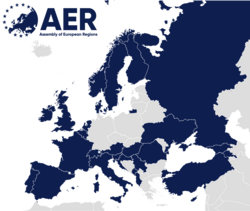Historical background
On 15 June 1985, at Louvain-la-Neuve (Walloon Brabant), 47 Regions and 9 interregional organizations founded the Council of the Regions of Europe (CRE), which would later become the Assembly of European Regions in November 1987 at the second General meeting of the Regions of Europe in Brussels.
The year 1985 was proclaimed by the United Nations as the International Youth Year. The same year AER launched its first programme, Eurodyssey, designed to promote and encourage youth mobility.
In 1990, AER's Tabula Regionum Europae released the inaugural map depicting Europe not solely as a collection of countries but as regions. The following year, the principle of subsidiarity emerged as AER's flagship initiative, advocating for the involvement of regions in European and national decision-making. Its impact was swiftly recognized, culminating in its inclusion in the Maastricht Treaty of 1992.
The creation of the Committee of the Regions (CoR) in 1994 and the Chamber of the Regions in the framework of the Congress of Local and Regional Authorities of Europe (CLRAE) in 1994, exemplified a victory for AER in advocating for the regions in Europe.
In 1995, AER launched a campaign to promote regionalism in Europe. As a result, 300 AER members adopted in 1996 the Declaration on Regionalism in Europe immediately initializing a reference document for new and developing regions. [4]
In 2002, AER presented its position on the “Future of Europe” to the European Convention. AER actively contributed to the drafting of the European Constitution, demonstrating strong political involvement. The final text included all AER proposals, namely
- The recognition of the regions as an important level of governance within Europe.
- The extension of the principle of subsidiarity to regional and local levels.
- The inclusion of regional cohesion in EU's objectives.
In 2008, AER established the Youth Regional Network, Europe's first and only platform of regional youth councils, parliaments, and organizations.
This page is based on this
Wikipedia article Text is available under the
CC BY-SA 4.0 license; additional terms may apply.
Images, videos and audio are available under their respective licenses.

